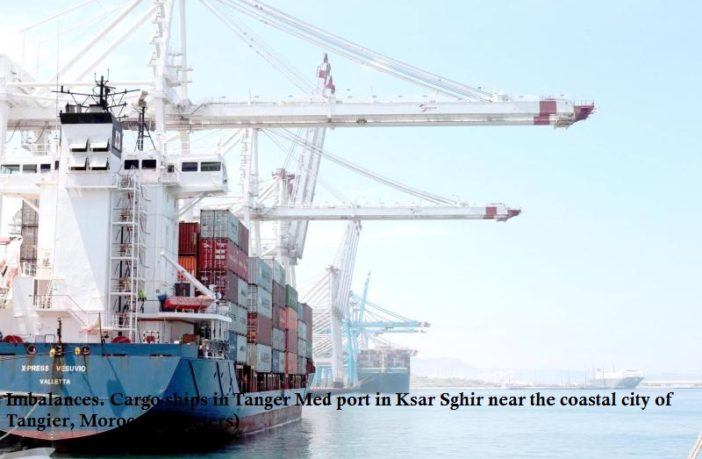The Arab Weekly
Trade between Morocco and Turkey reached $2.7 billion in 2018. Therefore, Rabat cancelled the tax exemption for Turkish textiles.
Considering the alarming growth of its trade deficit, Morocco is reconsidering free-trade agreements it has with other countries.
In a move seen by many as bold and in line with economic reform plans, Moroccan Minister of Industry, Trade and Green and Digital Economy Hafid Elalamy said the ministry was preparing an evaluation of all free-trade agreements.
Although Elalamy did not identify the targeted agreements, he pointed out that the ministry may cancel those that damage the country’s economy.
Analysts agree that the agreements did not consider mechanisms to protect local businesses from fierce foreign competition. They said Rabat’s decision to reassess its free-trade agreements was the result of damage to the local economy, as indicated by the ministry’s investigations that confirmed the comprehensive dumping of imported goods, especially from Turkey, in the local market.
The analysts said the realities impose a new approach to trade agreements based on adopting those deals with regional groups, as opposed to bilateral ones, to avoid competition shocks.
Elalamy stressed that the government was ready to comprehensively consider all partnerships harmful to the Moroccan economy and study the files rationally.
Since 2006, business circles in Morocco have been clamouring for a review of Morocco’s trade agreements because they were, in their view, unfair.
Data from the Office of Exchange indicated that Morocco’s trade deficit rose 2.4% in the first nine months of 2019, compared to 2018. From the beginning of 2019 until the end of September, the deficit grew $15.8 billion, an increase of about $370 million compared to the same period in 2018.
Trade between Morocco and Turkey reached $2.7 billion in 2018. Therefore, Rabat cancelled the tax exemption for Turkish textiles, a decision taken by the ministry more than a year ago to protect the local textile sector. Transitional amendment measures referred to in Article 17 of the Free Trade Agreement between Morocco and Turkey on certain textile and clothing products also were activated.
The value of taxes on Turkish imports of textile and clothing products has been raised to 9%. The Moroccan government justified the move by the negative effects Turkish imports had on the local textile sector and other foreign suppliers to Morocco.
There are 80 Turkish companies established in Morocco working in the textile, food and furniture industries and other sectors such as real estate, public works and infrastructure.
Many sectors complain about flooding the market with products that are detrimental to their position in the local market. The Moroccan Association of Textile and Clothing Industries said this was the case in the textile and clothing sector.
The association accused some foreign-trade partners of ill intentions from the beginning since they have breached commitments to import Moroccan goods. Morocco’s textile and leather exports, for example, declined 1.2% to $1.9 billion, representing 12.9% of Morocco’s total exports.
Local exporters pointed out the need to revise Morocco’s free-trade agreement signed 13 years ago with the United States. They demanded easier access for greater quantities of Moroccan goods to the US market and for better opportunities to take advantage of the possibilities offered by it.
Association President Hassan Sintissi stated that the free-trade agreement with Washington offers a range of opportunities in the US market that Moroccan exporters have not fully exploited. He attributed this to strict measures facing them and called for a review of the agreement and consideration of specificities of local small and medium-sized enterprises.
The parliamentarian group of the General Confederation of Moroccan Firms pointed out that Rabat has a wide network of preferential and free-trade agreements that give it access to a potential market of 1 billion consumers with high purchasing powers worldwide but taking advantage of the agreements poses major challenges.
The open and free trade brought about by the agreements resulted in a strong acceleration of imports leading to a structural trade deficit. In 2000, the deficit stood at about $3 billion. It climbed to $5 billion in 2003 and doubled in recent years.
Data from the Ministry of Economy indicated that the rise in Moroccan exports in the first half of 2019 did not positively affect the trade deficit. Imports rose 2.9% to $34 billion, against exports of $19 billion, despite a 3.2% increase.
Given Morocco’s chronic trade deficit, the Directorate of Financial and Prospective Studies recommended a comprehensive review of the country’s free-trade agreements and a search for ways to rebalance trade relations with the most important companies.
The report stressed the need to strengthen the arsenal of protectionist measures to combat unfair competition and enhance border controls to counter smuggling, false statements and fraud, saying this would preserve the integrity of the domestic market.

Written ByMohamed Alaoui
Mohamed Alaoui is a Moroccan writer.







